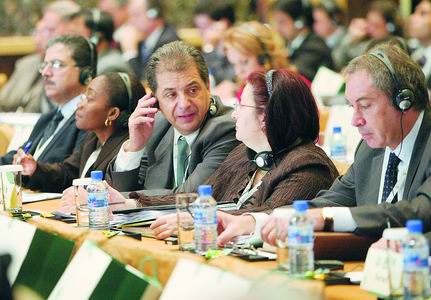
More than 400 World Expo delegates and businessmen
attend the Second Participants Meeting of World Expo Shanghai 2010 that wrapped
up on Friday. ¡ªShanghai Daily
Shanghai Daily news
Preparations for World Expo 2010 are right on track. Organizers brief 400
national delegates and business people on everything from wheelchair access and
prayer rooms to vegetarian menus.
More than 400 World Expo delegates and business people from around the world
converged on Shanghai this past week for an update on the world's fair that will
symbolize the 21st century and put China in the spotlight.
The message: Planning and construction for the World Expo in 2010 is right on
track. Organizers are thinking of everything from keeping it green to providing
wheelchair access, vegetarian menus and prayer rooms.
The Second Participants Meeting of World Expo Shanghai 2010 wrapped up on
Friday at the Four Points by Sheraton Youyou Hotel.
So far, 180 countries and international organizations have signed up for the
184-day event that begins on May 1, 2010. China's goal is 200 participants. The
theme is "Better City, Better Life," as more and more people are migrating to
cities worldwide and urban problems take center stage.
During the two-day working meeting, Chinese officials delivered briefings on
all aspects of preparations, national delegations viewed the site where their
pavilions will be built and Expo questions were raised and answered.
A highlight of the event was the launch of a one-stop Website for
participants, www.expo2010.china.com. This enables all participants to check on
progress and interact with organizers.
"The meeting was conducive to cooperation, meaningful and productive," said
Zhou Hanmin, deputy director general of the Bureau of Shanghai World Expo
Coordination.
Vicente Loscertales, secretary general of the Bureau of International
Expositions (BIE), said the reports were very useful to participants.
"This
is a very practical, working meeting for both participants and organizers. I am
here to find useful information, guidelines and milestones," said a French BIE
representative.
Badeji Abikoye, trade commissioner from Nigeria, said his country has high
expectations of the Expo, especially in showcasing solutions to pollution
problems. Nigeria, Africa's most populous country, is highly urbanized and is a
major oil producer. Air, water and soil pollution are major issues.
Serbian delegate Milica Zatezalo said the Shanghai Expo will be a big
challenge "because it's the first time that Serbia has taken the floor as an
independent country. It's a huge opportunity to let the world see another image
of Serbia."
Maria Asunta Accili, secretary general of the Italian Commission for World
Expo 2010, said the participants' meetings were well organized.
Loscertales of BIE emphasized that these were working meetings, practical
sessions in which details could be worked out and questions answered.
For countries at the earliest stages of preparations for the Expo, these
meetings were useful for their initial exploration. "It's a chance to network
and get to know people," said Bernard Testu, Expo commissioner general of
France.
Participants with more concrete plans for their pavilions, such as the
Italian and Serbian delegations, were keen on finding out the location of their
pavilions and operational details.
In many question-and-answer sessions, delegates raised their particular
concerns. The British delegation raised the issue of access for people with
physical disabilities and the vision-impaired. Arild H. Bilxrud, Norwegian
project director for the Expo, added that provisions should be made throughout
the Expo for people with disabilities.
Expo organizers have promised that the event will be easily accessible to
those with disabilities, and an exhibition will be devoted to the issues of
urban people with disabilities.
Asian delegates also raised the issue of catering for different religions,
such as prayer rooms for Muslims, and dietary requirements, such as vegetarian
menus.
Organizers are making provisions for visitors of different religions and
those with different dietary requirements.
For international organizations like the World Trade Organization the session
was a chance to promote their message. "We have projects in 309 cities, and the
greatest challenge for us will be to represent the uniqueness of each in 181
days of the Expo," said a WTO delegate.
For developing countries, mass urbanization is a pressing issue. "Our cities
are developing," said Ramadhan Hashim Kahlfan of Tanzania, "so we need to know
how best to manage this process. We can learn a lot from the Chinese and from
this Expo."
"The city theme really fits well with the history of Italy," said Professor
Beniamino Quintieri, Italian commissioner general for the Expo. "Even in our
smaller cities there is not just economic development but a sense of cultural
identity, a local tradition. This is what we want to teach the world - the
harmonious combination of technology with art, with the environment and with
culture."



